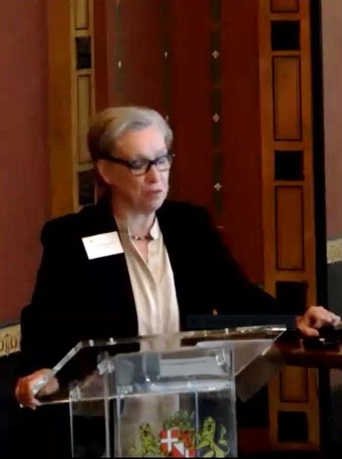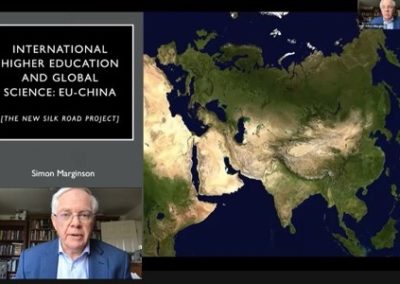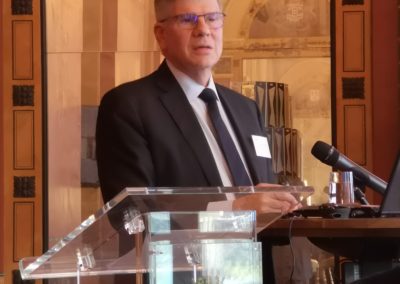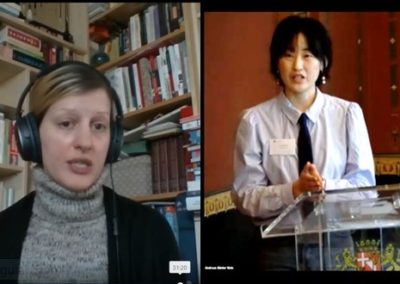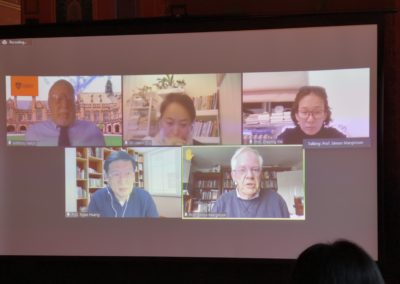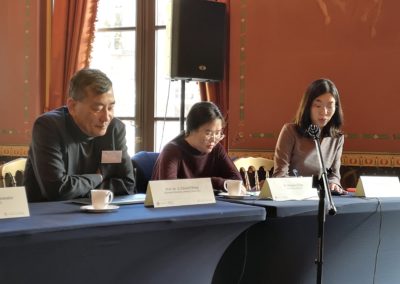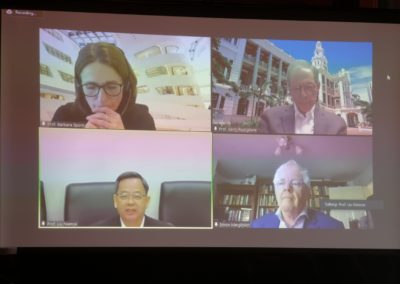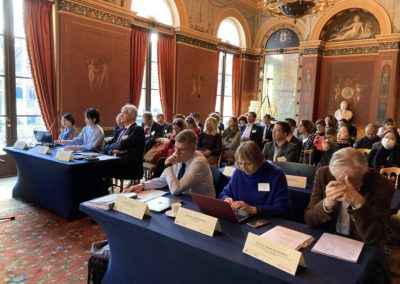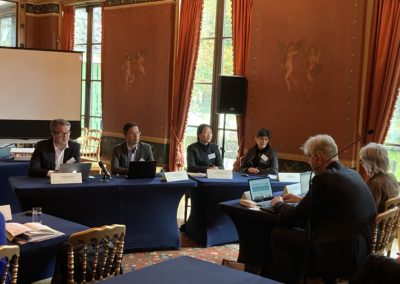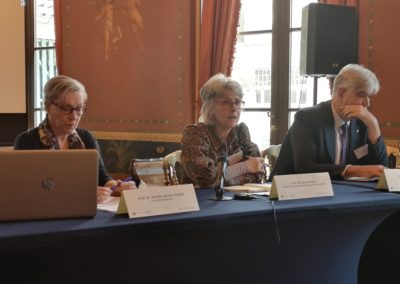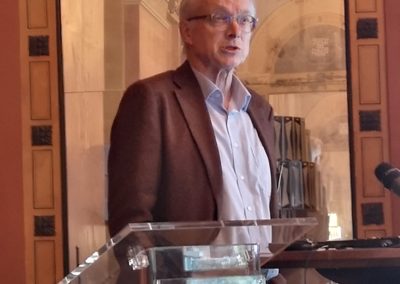International Higher Education and Global Science
China and Europe on the New Silk Road. Connecting Universities Across Eurasia. Edited by Marijk van der Wende, William C. Kirby, Nian Cai Liu, and Simon Marginson. Oxford University Press (2020).
Conference Information
4 – 5 November 2021
Utrecht, The Netherlands
Full Title: International Higher Education and Global Science: Europe-China relations in a Changing World Order
Details
4–5 November 2021
Paushuize
Utrecht, The Netherlands
(The conference was jointly organized and convened by Utrecht University and the University of Göttingen)
On 4–5 November, a conference on “International Higher Education and Global Science: Europe-China relations in a Changing World Order” took place in Utrecht, the Netherlands. The conference looked at how international higher education, global collaboration, open science, and Sino-European-US connections are evolving in the changing world order.
The conference built on the international research project on the New Silk Road’s implications for higher education and research cooperation and focussed both on the research and the policy agendas.
On 4 November, researchers exchanged and updated their insights from inquiry and explored the agenda for further research. On 5 November, a wide range of actors and stakeholders engaged in panels discussing the emerging policy agenda for higher education and research collaboration and its implications for universities and their leadership.
The conference was conducted at Paushuize in a hybrid format, allowing a combination of on-site and online contributions, interaction, and attendance.
The event was hosted by Utrecht University in collaboration with the University of Göttingen and with kind support from the Volkswagen Foundation.
Venue address:
Paushuize
Kromme Nieuwegracht 49
3512 HN Utrecht, The Netherlands
Videos
Short Context Clip: “Dual-Use Export Controls & Higher Education” by Claire Stalenhoef
More Information
Speaker: Claire Stalenhoef, Utrecht University, The Netherlands
Title: Dual-Use Export Controls & Higher Education
Knowledge Clip: “Export Controls on Dual-Use Items and the Impact on Universities and Academics” by Claire Stalenhoef
More Information
Speaker: Claire Stalenhoef, Utrecht University, The Netherlands
Title: Export Controls on Dual-Use Items and the Impact on Universities and Academics
Presentations
View Presentations Slides (click a title for the PDF)
Prof. dr. Marijk van der Wende, Utrecht University: “International Higher Education and Global Science: Europe-China relations in a Changing World Order.“
Prof. dr. Simon Marginson, University of Oxford: “International Higher Education and Global Science: EU-China.“
Jelena Gledić, MA (University of Belgrade) & Dr. Qiao Congrui (VU Amsterdam): “Young Scholars on the Future Research Agenda.“
Dr. Zhu Jiabin, Shanghai Jiao Tong University: “International Higher Education and Global Science: A Perspective from Engineering Education in China.“
Dr. Gao Jie, Aarhus University: “The Multiple Layers of B & R Initiative.“
Prof. dr. Sybe de Vries, Utrecht University: “Some Reflections from an EU Public Economic Law Perspective.“
Mr. Alexander G. Welzl, China Data Analysis and Research Hub (CDA): “Innovation and Translational Research as Key Drivers of New Structural Economics – European Perspectives on China’s Global Development Narrative.“
Dr. Zhan Mengshu, University of Bonn: “African Students in China.“
Prof. Dr. Cao Yin, Tsinghua University: “Asian Studies in China: Challenges and Possibilities.“
Prof. dr. William Kirby, Harvard University & Harvard-China Fund: “Empires of Ideas: Creating the Modern University, From Germany to America to China.“
Mr. Vojko Bratina, Science and Technology Section, EU Delegation to China, Beijing: “Europe China Relations in a Changing World Order: Changing Conditions and Regulations
for Collaboration.“
Dr. Machiko Kanetake, Utrecht University: “Dual Use Export Controls & Research / Education.“
Ir. Peter Gill, Delft University of Technology: “Why Finding the Balance Is Needed for Academic Institutions.“
Dr. Zhang Xiaoyong, Wageningen University & Research: “Implication and Dilemmas: Open Science, Academic Freedom, Integrity and Security.“
Dr. Ágota Révész, Technical University Berlin: “Implication and Dilemmas: Things Making Exchange Difficult (and a Few Suggestions).“
Prof. dr. Johan van Benthem, Director Joint Research Center in Logic at Tsinghua University, Stanford University, and the University of Amsterdam: “Logic in China and The West: Close Encounters of the Third Kind.“
China and Europe on the New Silk Road
–
Connecting Universities Across Eurasia
Edited by Marijk van der Wende, William C. Kirby, Nian Cai Liu, and Simon Marginson
The new book China and Europe on the New Silk Road Connecting Universities Across Eurasia (Oxford University Press) was successfully launched On 5 November in a well-addended Zoom webinar.
The book addresses the opportunities, controversies and tensions surrounding the New Silk Road. It looks at how universities, while faced with challenges to their autonomy and values, stand firm to defend global cooperation.
Description
Opening chapters present the global context for the NSR, the development of Chinese universities along international models, and the history and outcomes of EU-China cooperation. The flows and patterns in academic cooperation along the NSR as they shape and have been shaped by China’s universities are then explored in more detail. The conditions for Sino-foreign cooperation are discussed next, with an analysis of regulatory frameworks for cooperation, recognition, data, and privacy. Comparative work follows on the cultural traditions and academic values, similarities, and differences between Sinic and Anglo-American political and educational cultures, and their implications for the governance and mission of higher education, the role of critical scholarship, and the state and standing of the humanities in China. The book concludes with a focus on the “Idea of a University”; the values underpinning its mission, shape, and purpose, reflecting on the implications of China’s rapid higher education development for the geo-politics of higher education itself.
Press Release
This is not a time to be silent.
This book addresses the opportunities, controversies and tensions surrounding the New Silk Road. It looks at how universities, while faced with challenges to their autonomy and values, stand firm to defend global cooperation.
The global order, based on international governance and multilateral trade mechanisms, built in the aftermath of World War II, is changing rapidly. Notably Brexit and the retreat of the USA from multilateralism have created waves of uncertainty, not the least in the field of higher education, regarding international cooperation, the free movement of students, academics, scientific knowledge and ideas.
Meanwhile, China is launching new global initiatives with its “New Silk Road”, is developing its higher education and research systems at speed, and is actively seeking to cooperate with academic partners along the New Silk Road.
It is unclear how these new relationships will affect European higher education and research; how this cooperation will contribute to addressing the global challenges we are all being faced with, and to the global common good. How this emerging reality can conform with current Western views and growing criticism of China concerning the key values of an open society, the belief in fundamental human rights, dignity, and the rule of law. And how the growing tensions between US and Chinese trade and security agendas and neo-nationalist trends influence collaboration. How can universities tackle these and stand firm to defend internationalization, autonomy, and academic freedom?
Clearly, this is not a time to be silent. Therefore the ambition of this book is to be open to the various perspectives and controversies surrounding the NSR, to build understanding for both sides, and to strengthen hope for continued global collaboration. It aims to critically explore the possible implications of the NSR for higher education and research cooperation between China and Europe, by looking at the main challenges and opportunities, including a consideration of the risks and uncertainties in the context of growing sensitivities in relationships between China and the West.
To this end, it presents a rich collection of contributions from an international and interdisciplinary group of scholars from Europe, Asia (notably China), the USA, Russia, and Australia, who were engaged in a two-year dialogue under the research project on “The New Silk Road: Implications for higher education and research cooperation between China and Europe”. It combines perspectives from anthropology, computer sciences, economics, education, history, law, political science, philosophy, science and technology studies, sinology, and sociology.
Central questions regard how academic mobility and cooperation are taking shape along the New Silk Road, under which conditions, defined by whom, and based on which values? And what, if any, difference will the New Silk Road make in the global higher education landscape?
The global Covid pandemic makes these findings only more relevant; how will it impact the main trends and issues in collaboration between China and the West? Which trends in academic cooperation with China will be sustained, enhanced, rebalanced, delayed, or even reversed? How will the EU position itself? And what is most at stake in the changing geopolitical order: international collaboration, competition, trust, open science, globalization as such?
The emerging new global context provides abundant food for thought and a wealth of questions for further research. The editors remain convinced that such research should be undertaken in close collaboration between China and the West.
About the editors:
Marijk van der Wende, Distinguished Faculty Professor of Higher Education, Utrecht University
William C. Kirby, T. M. Chang Professor of China Studies, Harvard University
Nian Cai Liu, Director of the Center for World-Class Universities, Shanghai Jiao Tong University
Simon Marginson, Professor of Higher Education, University of Oxford
More information:
Table of Contents | Author Information | For press and media inquiries, please Contact Us | Request a Copy for Review Here | View this Press Release as PDF.
The project is carried out by an international consortium coordinated by Utrecht University’s Centre for Global Challenges (UGlobe).
Site Notice & Privacy Policy
